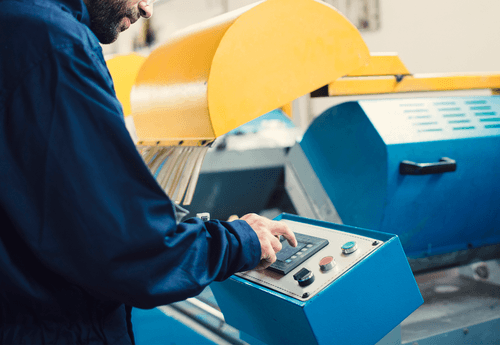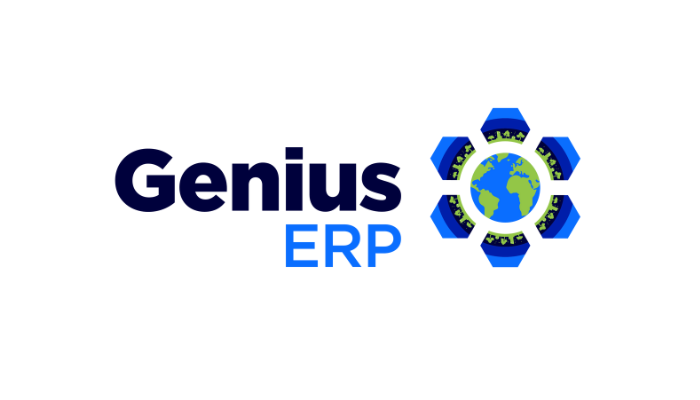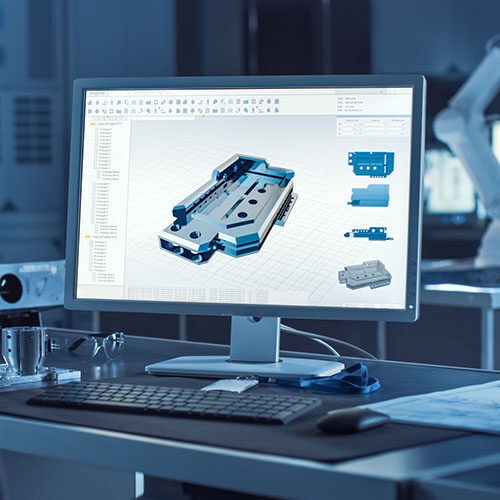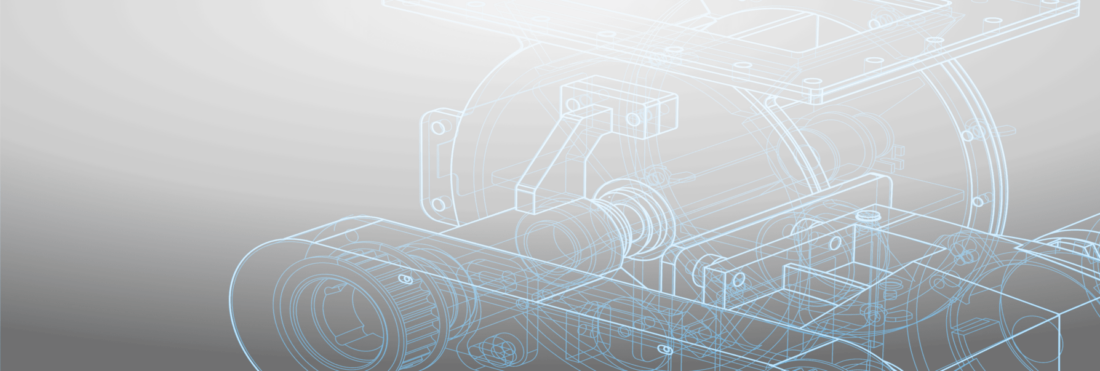
Getting your first ERP is a big step for a small business. There are many reasons to want one, including increased visibility of your entire operation, enhanced collaboration between departments, and improved productivity. But how, exactly, do you know if you are ready for one?
Below, we outline the top three signs your small manufacturing business is ready for an ERP.
3 Signs Your Small Business Is Ready for an ERP
1. Rapid Business Growth
This is the number one reason manufacturers start looking for an ERP system: Their business is growing fast, lots of changes are happening, and they need a more robust system to help them not only adapt to the changes within their organization but also to also support future growth.
If you are starting to experience rapid growth in terms of revenue, workers, or processes, it’s time to start thinking about getting an ERP system. An ERP will help you manage your new and expanding organization. With one, you can streamline your processes and automate time-consuming tasks, allowing your small shop to be more efficient and take on more jobs.
ERP solutions designed for small businesses will assist you in organizing how you source, track, and manage orders, which in turn will help you to better manage your cash flow and get more jobs out the door on time. ERPs can automate tasks like inventory management and purchasing to save you both time and money and improve your shop’s efficiency — all of which will help give you time to focus on more important things, like growing your business even more.
RELATED ARTICLE: Motrec Is Ready to Grow With Genius ERP
2. You’ve Outgrown Excel
You could probably get by with Excel in the early days of your manufacturing business. It is, after all, an important business tool that can help you manage day-to-day operations. But over time, as your business grows, your processes become more complex, and you will need a more comprehensive tool to manage your business.
When you are just starting out, Excel is fine for managing everything from scheduling to inventory management to data analysis. But as your operations become more complicated and you have more customers and jobs you need to fulfill, you need to get a tool that can handle more.
The fact is that spreadsheets don’t deliver real-time data and aren’t flexible enough for a complex manufacturing business. If you are still using Excel to manage your business, you probably overhear regularly around your shop: “Are you sure you are working with the right file? It doesn’t look like the most recent version …”
The truth of the matter is that without real-time data, it doesn’t take much to throw your shop off.
A job may seem like it is going smoothly, but a problem can easily occur if you discover that you are out of a crucial component because the inventory levels weren’t properly documented on your spreadsheet. This delays the job, meaning you miss the deadline and disappoint a customer.
An ERP system can manage every element of your manufacturing company for you from one completely integrated system, including production, planning, purchasing, manufacturing, sales, distribution, accounting, and customer support.With total visibility of your operation you willoptimize your production, and ensure you always deliver on time.
3. More Problems Are Occurring in Your Business
Without an ERP system, your manufacturing company will be more prone to issues and problems. Your data, including financial accounts, will contain errors, and you will be more likely to waste time following bad business decisions. To ensure your shop runs smoothly — and to increase production and efficiency — you will benefit greatly from ERP software.
With an ERP, your entire shop will be integrated, and you can do away with multiple spreadsheets, uncoordinated systems, andpaper-based orders; plus an ERP system will help increase accuracy and efficiency within your organization. Your staff will no longer have to spend hours manually cross-referencing and re-entering data as all company information is in a single database. Thanks to an ERP system, your employees can work more productively and have more time to focus on important responsibilities.
Modern ERP solutions not only include financial and accounting capabilities, manufacturing, supply chain management, advanced reporting, business intelligence, and project management, but they also can offer field services, sales force, marketing automation, and CRM management — everything you need to manage a manufacturing business in the 21st century.
Advantages of an ERP System for Small Manufacturing Businesses
An ERP will give your business many competitive advantages:
- One centralized platform
- Reduced human error
- Accurate job costing
- Better inventory control
- Integrated and automated business processes
- Reliable real-time data
- Optimized production schedules
- Higher flexibility
- Better business analytics
- Increased collaboration
- Improved planning and forecasting
- Increased throughput
- Better data control
- Maximized shop capacity
Make Better Decisions for Your Business
ERPs are great tools for small businesses and can help you to make better decisions about your business to guide it in the right direction. When your small business is going through rapid growth, there is no better time to get an ERP. The decisions you make about your business now are going to have a lasting impact on your future and can set you up for success or failure.
ERPs give you access to the information and data you need to make the best decisions possible. Using your ERP’s tools to analyze your data will help you become a more efficient, leaner, and productive organization. Your ERP can show you where there are gaps or inefficiencies in your production line and help you improve your manufacturing processes.
Manufacturers rely on Excel far too frequently to evaluate their data and produce reports. Excel lacks the real-time capabilities that manufacturers need and is not sufficiently reliable. Companies can cut operational costs by 23% and administrative costs by 22% by using ERP software that delivers precise, real-time information about everyday operations.
—-
Knowing when to make the move to an ERP is crucial for a small business. Click here for more information on how to make an ERP work for your small business, plus learn our top tips on how to select the right ERP for you.
4. Promote Your Booth Ahead of the Show
The next crucial step is to advertise and promote your presence at the trade show ahead of time. Many manufacturers make the mistake of assuming that a well-designed booth will attract onlookers merely by its presence. The truth is that many trade show attendees research the booths and products they want to check out ahead of time, so if prospects are aware of your exhibit and any special offers before the show, they will be more likely to seek you out.
You can try promoting your participation in the trade show through social media platforms, blogs and email campaigns. Use these to create excitement, tease product launches and provide updates during the event. During the show, you can also engage with attendees online and encourage them to visit your booth and share their experiences.
5. Engage With Attendees
One of the keys to standing out at trade shows is active engagement with booth visitors. Train your staff to be friendly, approachable and knowledgeable about your products. Encourage them to initiate conversations, ask open-ended questions and listen attentively to attendees’ needs. Offer product samples, giveaways or promotional materials to create a positive and memorable experience.
6. Embrace Technology
Use technology to enhance your booth’s appeal. Utilize large screens or digital displays to showcase product videos, testimonials or interactive presentations. Use virtual or augmented reality tools to offer immersive experiences or virtual tours of your manufacturing facility. Take advantage of social media platforms and event-specific hashtags to generate buzz and connect with attendees before, during, and after the trade show.
7. Host Presentations or Workshops
Another way to stand out from the competition is by hosting presentations or workshops that provide valuable insights or educational content related to your industry. Share your expertise, demonstrate the benefits of your products or discuss industry trends. This positions your company as a thought leader and draws attention to your booth.
8. Offer Unique Giveaways
Everyone loves freebies, but generic promotional items may be easily forgotten. Stand out by offering unique and useful giveaways that align with your brand and target audience. Consider personalized items, limited editions or exclusive discounts for trade show attendees. Creative and practical giveaways can leave a lasting impression and prompt potential customers to seek out your company after the event.
9. Network and Collaborate
Trade shows are excellent opportunities to network and collaborate with other industry professionals. Seek out partnerships or collaborations with complementary businesses to create a mutually beneficial presence. Co-hosting events, sharing booth space or cross-promoting each other’s products can significantly increase your visibility and broaden your reach.
10. Follow Up and Maintain Relationships
After the trade show has finished, the work doesn’t end, as you need to follow up promptly with the leads and contacts you made during the event. Personalize your messages, express gratitude for their visit and continue the conversation. Stay in touch through newsletters, targeted emails or social media engagement to nurture relationships and convert leads into customers.
Staying in touch and engaging with attendees after a tradeshow allows you to nurture the relationships you established during the event, keeping your brand fresh in their minds. Following up also shows your commitment and professionalism, reinforcing the positive impression you made during the tradeshow. By connecting with attendees post-show, you can maximize the long-term benefits of your tradeshow participation and foster lasting relationships with potential customers.
—-
Trade shows present a valuable opportunity to generate high-quality leads for your business. As most trade show attendees need to be registered or involved in your industry, they are likely to have a genuine interest in your products and services. As a result, you’re making contact with potential customers who are looking for what you have to offer, allowing you to connect with them, nurture their interest and ultimately convert them into new customers.
Stay tuned for the next installment in our Marketing for Manufacturing series, where we will share our top tips on how to use social media to market your manufacturing business.
Get your eBook Scared to implement a new ERP?
"*" indicates required fields



